A line is not a line
In Hollywood terms, a good story often follows the principle of a good “logline.” Screenwriters need to clearly and concisely capture the core of the story and gauge whether it can quickly pique public interest. For example, “A methodical and routine-bound university professor takes on a side job as a professional hitman, falls in love with his desperate employer, who kills her abusive husband, while he kills his colleague with a plastic bag” sets the tone for a dark crime comedy.
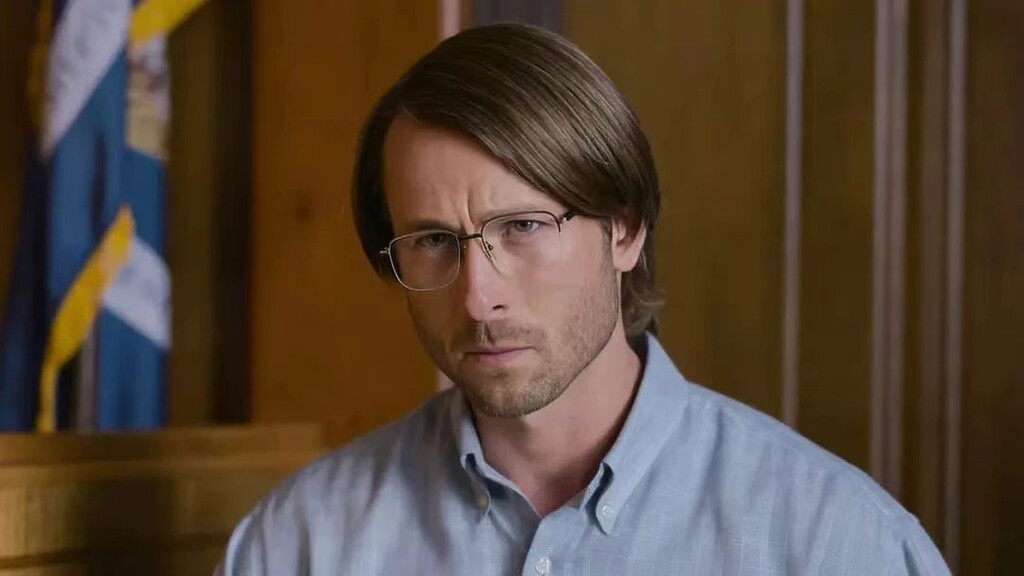 When watching Richard Linklater’s films, one cannot overlook the dialogues. His classic “Before Trilogy” stands out in the romance genre, but we’ll discuss that later. Let’s first talk about his “new” film *Hit Man* (new at the time of writing this article). The film exudes a relaxed, confident, sexy, and playful vibe. The director masterfully paces the narrative, deftly deconstructing the traditional hitman image, blending it with philosophical interpretations of the superego and moral dilemmas, and injecting it with bold, dark humor.
When watching Richard Linklater’s films, one cannot overlook the dialogues. His classic “Before Trilogy” stands out in the romance genre, but we’ll discuss that later. Let’s first talk about his “new” film *Hit Man* (new at the time of writing this article). The film exudes a relaxed, confident, sexy, and playful vibe. The director masterfully paces the narrative, deftly deconstructing the traditional hitman image, blending it with philosophical interpretations of the superego and moral dilemmas, and injecting it with bold, dark humor.
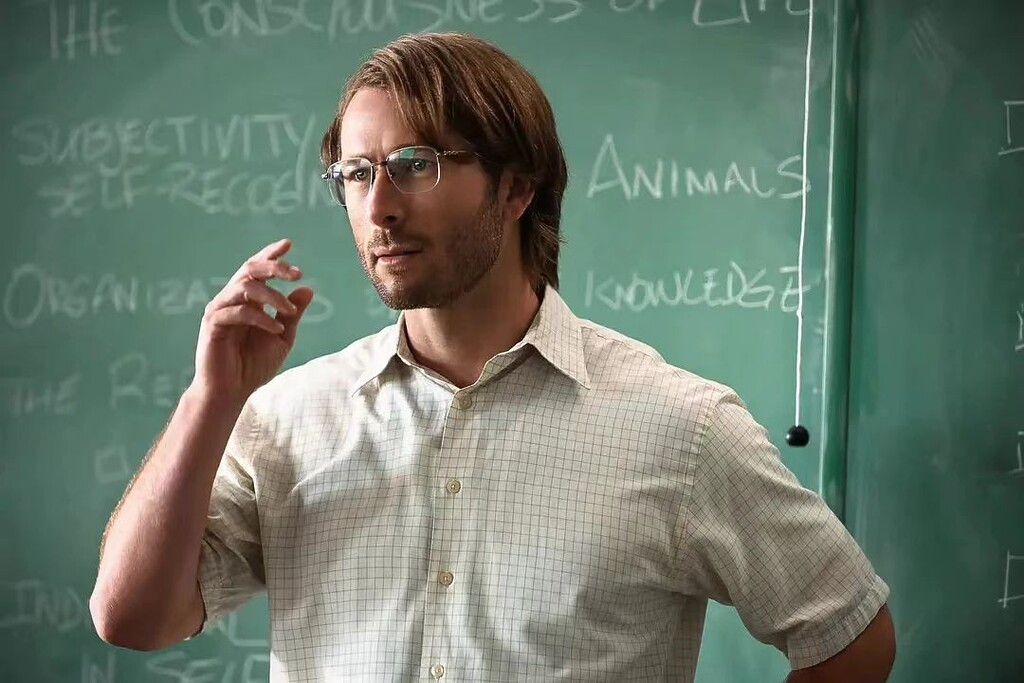 The protagonist is a university professor who teaches psychology and philosophy, leading a regular and somewhat dull life. He also has a side job at the police department, where, following tips from informants, they gather information on suspects wanting to hire hitmen. The police then send someone undercover as a hitman to meet with the client, coaxing them into revealing their reasons and intentions, after which the police use the confession to arrest the client.
The protagonist is a university professor who teaches psychology and philosophy, leading a regular and somewhat dull life. He also has a side job at the police department, where, following tips from informants, they gather information on suspects wanting to hire hitmen. The police then send someone undercover as a hitman to meet with the client, coaxing them into revealing their reasons and intentions, after which the police use the confession to arrest the client.
One day, the protagonist receives a job from a client named Madison, who has briefly worked as a hairdresser and flight attendant. Her parents are divorced, and her husband works in a family-owned oil business, with no criminal record but a few domestic violence complaints.
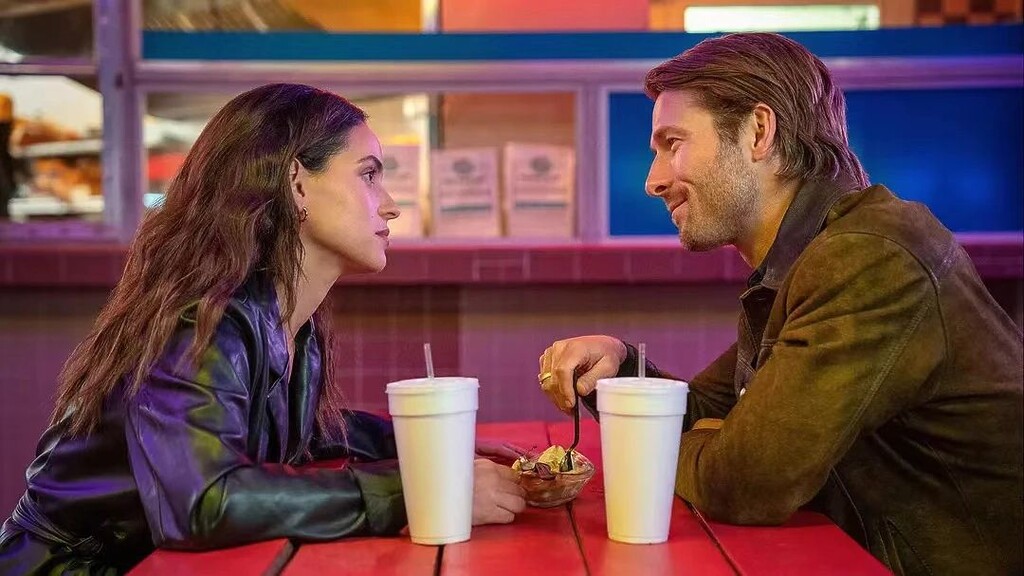 The two meet at a restaurant. The first thing Madison asks is, “Is your pie good?” If the protagonist had responded with just “Yes” or “No,” the conversation would have been too mundane. Casual small talk is fine in real life, but in films, dialogues usually carry a subtext, either conveying an underlying message or shaping a character’s traits.
The two meet at a restaurant. The first thing Madison asks is, “Is your pie good?” If the protagonist had responded with just “Yes” or “No,” the conversation would have been too mundane. Casual small talk is fine in real life, but in films, dialogues usually carry a subtext, either conveying an underlying message or shaping a character’s traits.
Here, the protagonist’s main job is as a university professor, but in front of the client, he is a hitman. So, his first line wouldn’t be too crude or scholarly; instead, he says, “All pie is good pie,” acknowledging everything while denying everything, creating an ambiguous feeling that reflects his dual identity. This interesting yet elusive response makes Madison slightly lower her guard, and after exchanging names, they sit down.
The protagonist asks, “What do you do for a living?”
Madison replies, “Housewife,” followed by, “He doesn’t let me work,” and then, “Actually, he doesn’t let me do anything.” Here, the dialogue not only serves the conversation but also, combined with Madison’s facial expressions, reveals the subtext that there’s tension between her and her husband, and her married life is unsatisfactory, fulfilling the dramatic function of the dialogue.
Further down, Madison asks if she can have a bite of the protagonist’s pie. He is surprised, and she explains, “He makes me do ridiculous diets,” sketching out her husband’s image and her own role/status in the family within a few words. The dialogue isn’t just words but also conveys actions, expressing her restrained anger towards her husband.
At this moment, Madison’s gaze falls on a nearby dog, and the conversation shifts to animals.
Madison: “So cute,” “Do you like dogs?”
Protagonist: “Do I look like a cat person?”
Madison: “I don’t understand the charm of cats; they’re creepy. I always think of those stories where jealous cats suffocate babies.”
Firstly, Madison’s attempt to hire someone to kill her husband shows she isn’t a naive, sweet character. Secondly, her initial impression of cats exposes her dark and violent inner nature, making it plausible when she later shoots her husband without hesitation, aligning with her character’s backstory. In movies, a single line can represent an action, convey subtext, and reveal or symbolize a character.
Besides many interesting details in the dialogues, the film also highlights the contrasts and conflicts within the characters. The protagonist’s “id” is a university professor, but it’s like he’s taken on the role of an actor playing a hitman. He must perform convincingly, satisfying every audience.
During one assignment, perhaps out of sympathy, the protagonist lets Madison go before she is incriminated. After mutual probing, they develop feelings and fall in love. Throughout their relationship, the protagonist never reveals his true profession, continuing the “hitman” charade. In this relationship, he loses his “self,” possibly believing in his own act as time goes on.
The transformation from a “hitman” to the hitman’s “superego” originates from Madison’s first shot—she kills her husband, forcing the protagonist to kill his colleague who is about to expose them, turning him into a real killer. Their relationship evolves from a couple hiding their true identities to accomplices in a crime.
The transition from fabricated identities to genuine selves, set against the backdrop of the protagonist’s psychological teaching, fundamentally explores the concepts of id, ego, and superego. The director skillfully creates surprises within reason, delving into the exploration of human choices.
In this play within a play, it’s impossible to define what kind of character the protagonist truly is or which identity represents his real self. Although his life is scripted, the plot provides the audience with more to ponder. The absolute right or wrong stems from the protagonist’s choices, with different seeds leading to different actions, logic, and outcomes. The film’s conclusion presents an apparently satisfying outcome, but is it truly so?
Returning to the same director’s classic *Before Trilogy*, I casually encountered this series when I’m younger, leaving little impression. But now, upon rewatching, it feels like a series of ripples spreading across my heart.
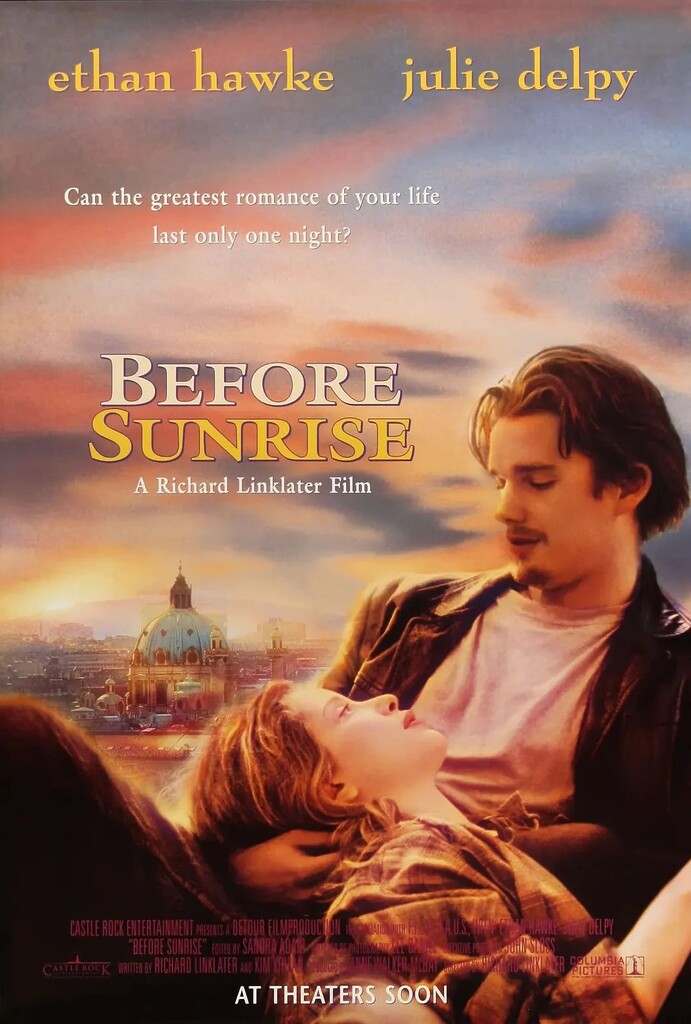 *Before Sunrise* is said to be based on the director’s real-life experience. In 1989, Richard met a girl in Philadelphia, and they spent a wonderful night together until dawn, which inspired him to create the film. In the movie, he sets their meeting on a train traveling across Europe. They both have books in hand, and the two young intellectuals meet a middle-aged couple trapped in a stifling marriage. At that time, for them—or for us when we were young—perhaps we all secretly vowed never to end up like that, yet somewhere along the line, we lost awareness as love turned into fish in a pond. We try to catch it, but when we do, our hands are stained with the trivialities of life.
*Before Sunrise* is said to be based on the director’s real-life experience. In 1989, Richard met a girl in Philadelphia, and they spent a wonderful night together until dawn, which inspired him to create the film. In the movie, he sets their meeting on a train traveling across Europe. They both have books in hand, and the two young intellectuals meet a middle-aged couple trapped in a stifling marriage. At that time, for them—or for us when we were young—perhaps we all secretly vowed never to end up like that, yet somewhere along the line, we lost awareness as love turned into fish in a pond. We try to catch it, but when we do, our hands are stained with the trivialities of life.
The trilogy spans 18 years, allowing the characters to fully experience the emotional cycle of meeting, falling in love, parting, reuniting, missing out, marrying, and having children. The entire film is driven by dialogue. The director uses dialogue to advance the plot.
From their accidental encounter, they talk about the books they’re reading, childhood memories, and thoughts on the future. The dialogue reveals the hidden subtext: they are both idealistic young people rebelling against utilitarianism. Their unexpected connection, limited time together, and the inevitability of parting the next morning create a scenario where they might never meet again, offering the opportunity for them to be unconventional and break free from tradition.
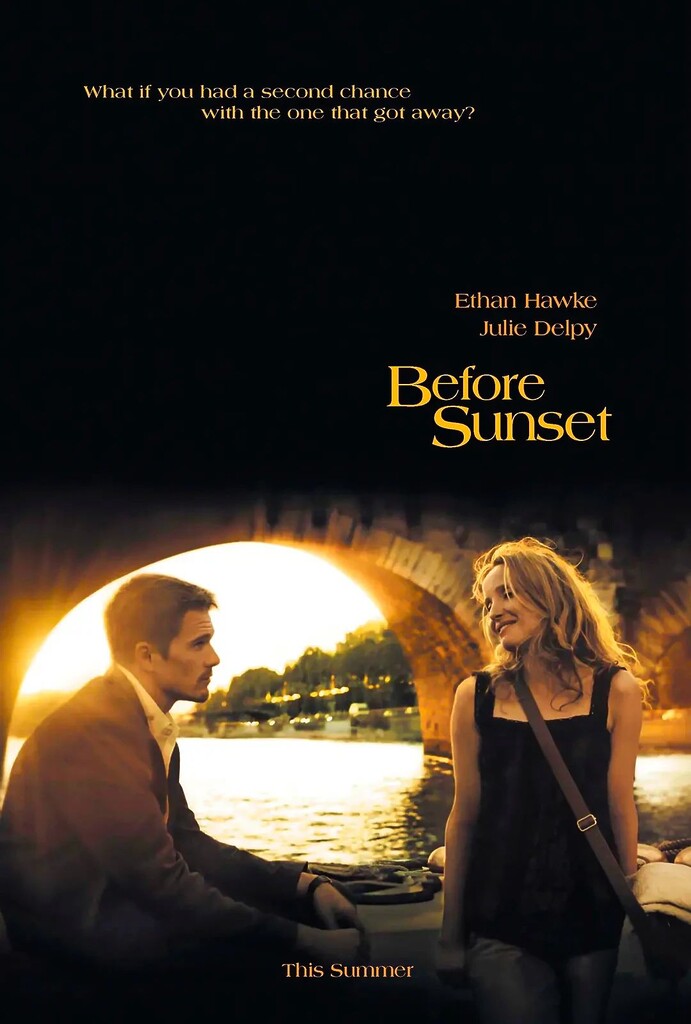 This time, I started rewatching from the second film, *Before Sunset*, which I actually prefer. The protagonist has become a bestselling author, and they reunite in Paris after many years. Both have shed the extreme romanticism of youth, replaced by a maturity that comes with time. They discuss the frustrations of love, politics, and social issues. Realism has drained romance, revealing a world full of regrets, compromises, tests, detours, fatigue, and numbness. The ending is particularly striking: the female lead, holding her guitar, sings a song she wrote, blending that night nine years ago into the melody. Everything remains unfinished,
This time, I started rewatching from the second film, *Before Sunset*, which I actually prefer. The protagonist has become a bestselling author, and they reunite in Paris after many years. Both have shed the extreme romanticism of youth, replaced by a maturity that comes with time. They discuss the frustrations of love, politics, and social issues. Realism has drained romance, revealing a world full of regrets, compromises, tests, detours, fatigue, and numbness. The ending is particularly striking: the female lead, holding her guitar, sings a song she wrote, blending that night nine years ago into the melody. Everything remains unfinished,
“You’re going to miss your flight.”
“I know.”
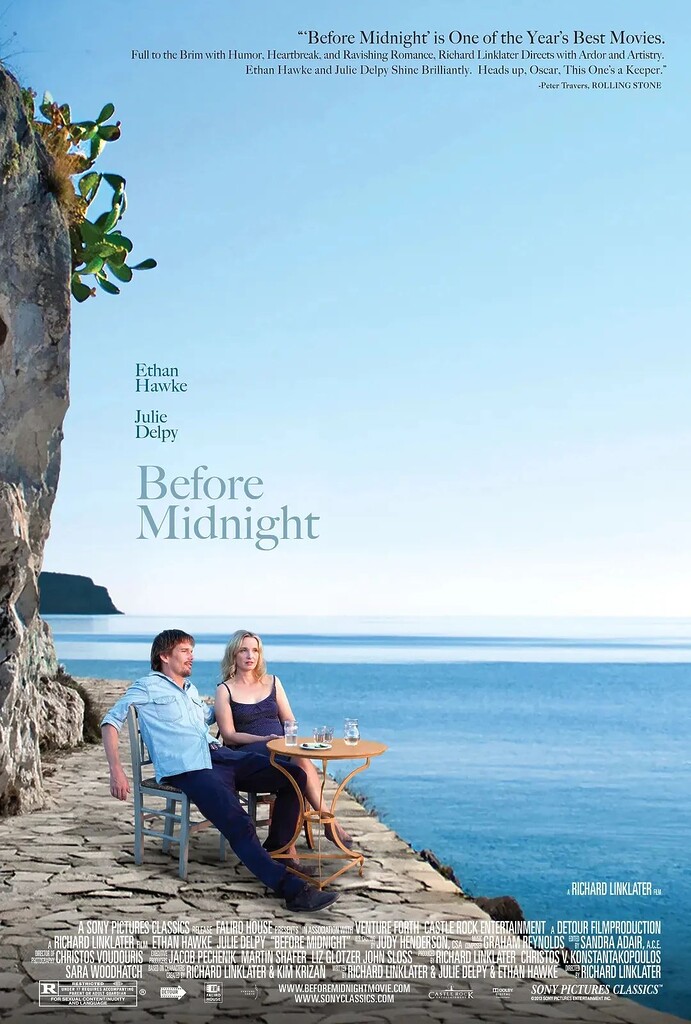 The third film, *Before Midnight*, begins with the protagonist sending off his son at the airport, advising him to learn piano, play soccer, and suggesting he should like sesame snacks. Has he, too, gradually become the kind of adult they disdained in the first film? The two leads are now deeply entangled in each other’s lives, with accumulated resentments, compromises, and affections laid bare. The mundane troubles of life ripple like the waves on the Greek island’s sea, ever-present, inescapable, yet essential. Watching the trilogy feels like moving from a sweet candy to a flavorful dish of stir-fried beef (especially on a secluded island—oh, how I miss that taste). The audience is immersed, savoring the experiences through the long dialogues.
The third film, *Before Midnight*, begins with the protagonist sending off his son at the airport, advising him to learn piano, play soccer, and suggesting he should like sesame snacks. Has he, too, gradually become the kind of adult they disdained in the first film? The two leads are now deeply entangled in each other’s lives, with accumulated resentments, compromises, and affections laid bare. The mundane troubles of life ripple like the waves on the Greek island’s sea, ever-present, inescapable, yet essential. Watching the trilogy feels like moving from a sweet candy to a flavorful dish of stir-fried beef (especially on a secluded island—oh, how I miss that taste). The audience is immersed, savoring the experiences through the long dialogues.
It seems that modern romance films are evolving into more thrilling genres like crime-suspense romance, ethical romance, sci-fi romance, and mystery romance. The plots are exciting and innovative. But looking back at these three slow-paced, quiet, simple love stories, it feels as if we’re walking in the protagonists’ shoes, experiencing their breath, their lives, and their everyday moments, side by side.






Love all the old romantic films in the old times.
翻译 Translate
“Hit Man” is an interesting and unorthodox film!
翻译 Translate
I love the 1st one so much!
翻译 Translate
I feel something sad. I talk about before sunset
翻译 Translate
For ‘before sunset’, Paris still beautiful and give warm feeling as usual. But
翻译 Translate
For before sunset, The dialogue very long. How can the actors remember it. Some line very sad.( it’s my opinion)
翻译 Translate
I finished watched it on the plan. I mean ‘ before sunset’
翻译 Translate
If you have time please watch the movie’How to be a millionaire before grand Ma dies ‘ it’s a movie from Thailand currently release in China.
翻译 Translate
I just watched perfect days . Have you watch it ?
翻译 Translate
Happy happy happy to read it.
翻译 Translate
Still haven’t watched these.movies
🥺🥺🥺
翻译 Translate
Will definitely find a time to watch Hitman, sounds interesting storyline as per describe from u 🥰🥰🥰
翻译 Translate
Sanjian i have finished the last movie before midnight today la, comparatively this 3rd and last one is not as good as previous series, and the ending is so sudden 😅 But anyway thank you again to introduce this series for me to watch them all again. Such compact & dense actors dialogues also very good to practice my english 😝
翻译 Translate
Did you watch this as reference for your next movie(s)?
翻译 Translate
San jian you know this series of sunrise sunset movie also recommended by my ex-boyfriend many years ago, i rmb i had try to watch but give it up very soon….now i will definitely watch them all and re-taste your words again 😘😘😘
翻译 Translate
Wowowww san jian & IT team!!! Is this re-post of wechat articles with english version newly create?!!!🥳🥳🥳 It’s soooo cool & international!!!! Did my words can reach you? 🥰🥰🥰 So great so professional 👍🏼
翻译 Translate
Wow, it’s the first time I notice the English version of Sanjian’s articles. So cool! I’m so glad that more people can see another shiny side of Zhehan. Great 👍
翻译 Translate
I love the way your mind works; I love how deeply you think about something as seemingly ‘simple’ – and as you say, somewhat archaic – as a romance film. It’s so fascinating to hear your thoughts 💙
翻译 Translate
Haven’t watched these movies yet
Can’t find it on Netflix
😂😂😂
翻译 Translate
I need more movie recommendations
Do you watch Korean drama, King?
翻译 Translate